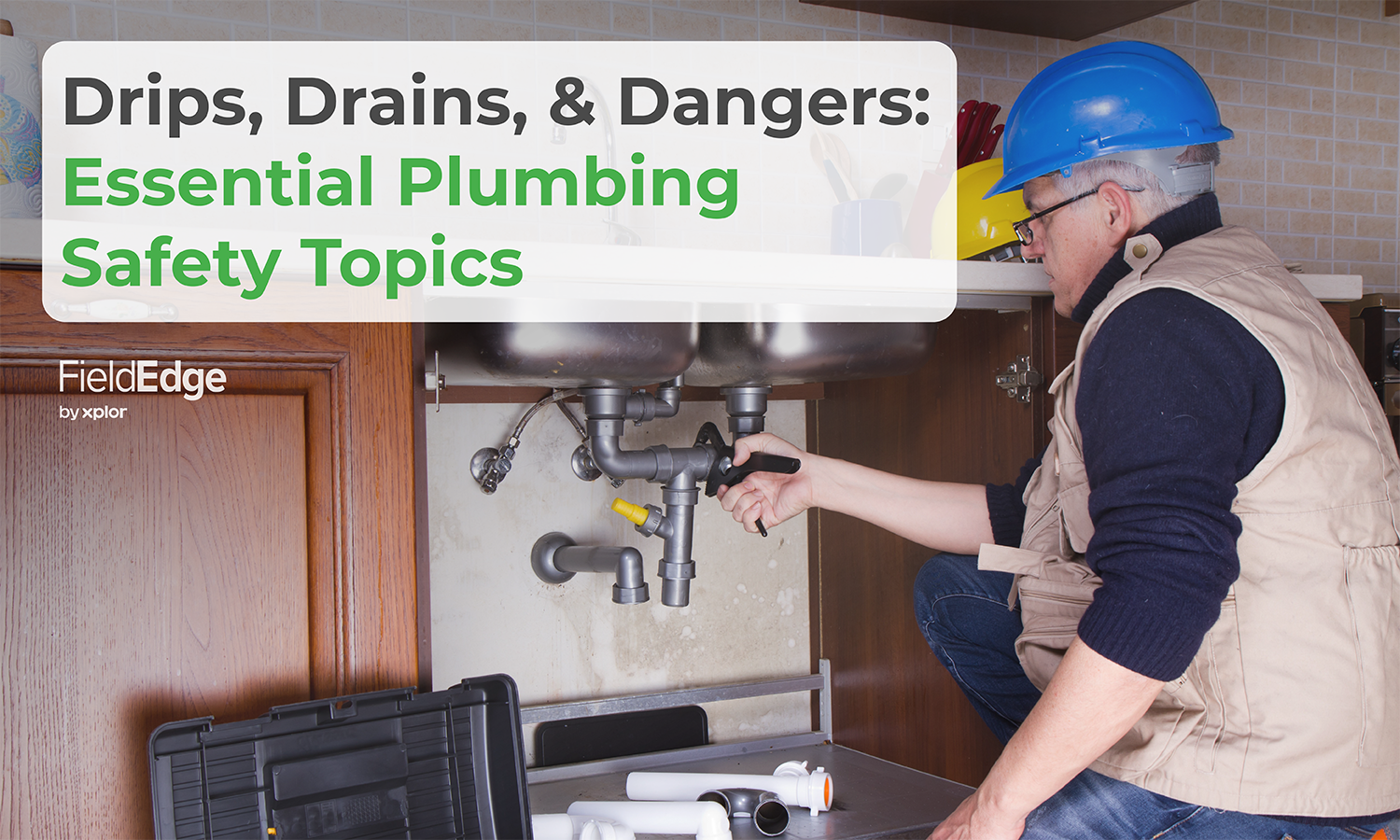Plumbing safety topics are essential to ensuring safety in your daily operations. From handling hazardous chemicals to working with electrical components, being aware of essential plumbing safety topics can protect your team, your clients, and your business reputation.
In this blog, we’ll:
- Explore the importance of plumbing safety topics
- Provide valuable insights to help your plumbing company elevate its safety standards
Understanding the Importance of Plumbing Safety Topics
Why are plumbing safety topics so important? The success and longevity of any plumbing company depends on it.
By prioritizing safety, you can:
- Protect your employees from potential accidents and injuries
- Demonstrate your commitment to professionalism and reliability
Plus, by prioritizing clients, they’re more likely to trust and recommend your company to others. In turn, this will boost your business’ reputation and success in the community.
Identifying Common Hazards in Plumbing Operations
As a plumber, there are several hazards that you have to deal with on a day-to-day basis. Let’s look at the top hazards and how to prepare for them.
Chemical Exposure
Handling hazardous chemicals, such as drain cleaners and solvents, poses significant risks to your employees’ health. Proper training and use of personal protective equipment (i.e. PPE) are essential to minimize exposure and prevent accidents.
Common personal protective equipment PPE for plumbers includes:
- Safety Glasses or Goggles: Wear eye protection to protect the eyes from flying debris, chemicals, and other hazards commonly encountered during plumbing work.
- Gloves: Provide hand protection against cuts, abrasions, chemicals, and hot or cold surfaces. Different types of gloves, such as latex, nitrile, or leather, may be used depending on the task.
- Hard Hat: Protects the head from falling objects, bumps, and head injuries in confined spaces or construction sites.
- Steel-Toe Boots: Offer foot protection against heavy objects, sharp tools, and electrical hazards. Steel-toe boots are sturdy and provide additional support while working on uneven surfaces.
- Respirator or Dust Mask: Protects the respiratory system from inhaling dust, fumes, and other airborne particles generated during plumbing tasks such as cutting, soldering or drilling.
- Coveralls or Work Pants: Shield the body and clothing from dirt, debris, chemicals, and abrasions. Coveralls or durable work pants provide full-body protection and may include features such as reinforced knees for added durability.
- Earplugs or Ear Muffs: Reduce exposure to loud noises from power tools, machinery or equipment commonly used in plumbing work. Protecting the ears helps prevent hearing loss and other auditory damage.
- Safety Vest: Increases visibility when working near roadways, construction sites or other high-traffic areas. High-visibility safety vests with reflective strips enhance visibility, especially in low-light conditions.
- Respiratory Protection: In situations where there is a risk of exposure to harmful gasses, vapors or airborne contaminants, plumbers may need specialized respiratory protection, such as a respirator with appropriate filters or cartridges.
- Fall Protection Equipment: For tasks performed at heights or on elevated surfaces, plumbers may require fall protection equipment such as harnesses, lanyards, and anchor points to prevent falls and mitigate the risk of injuries.
It’s essential for plumbers to assess the specific hazards associated with each task and select the appropriate protective equipment. Proper training on the use and maintenance of PPE is also crucial to ensure its effectiveness in protecting against workplace hazards.
Slip and Fall Accidents
As a plumber, you’re working with water. Which means, wet surfaces, cluttered work areas, and debris can contribute to slip and fall accidents. Maintaining a clean and organized workspace and promptly addressing spills can reduce the risk of injuries.
Electrical Hazards
Working with electrical components in plumbing systems requires caution and awareness of potential hazards. Train your team to identify and mitigate electrical risks, such as faulty wiring or exposed electrical components.
Implementing Effective Safety Protocols
Having clear safety protocols in place is one of the most important plumbing safety topics. This will help protect your business and employees.
- Employee Training: Provide training on plumbing safety tips to all employees, including proper equipment usage, emergency procedures, and hazard recognition. Regularly reinforce safety protocols through workshops and meetings to ensure ongoing compliance.
- Safety Equipment: Equip your team with the necessary safety gear, including gloves, safety goggles, hard hats, and non-slip footwear. Investing in high-quality safety equipment demonstrates your commitment to employee well-being and minimizes the risk of injuries.
- Routine Inspections: Conduct regular inspections of tools, equipment and work areas to identify potential hazards and address them promptly. Encourage employees to report safety concerns and participate in hazard identification to maintain a safe working environment.
Responding to Emergencies with Confidence
If an accident or injury does occur there are several things to keep top of mind. Addressing the accident quickly is crucial. Plus, you can learn from it to prevent it from happening again.
Emergency Preparedness
Develop clear protocols for handling emergencies, such as:
- Gas leaks
- Water leaks
- Chemical spills
Ensure that all employees are trained in emergency procedures and know how to respond effectively to minimize risks and prevent further damage.
Effective Communication
Establish reliable communication channels for employees to report safety issues or emergencies promptly.
Encourage an open-door policy where team members feel comfortable raising issues and seeking assistance when needed.
First Aid Training
Provide first aid training to equip your team with the skills to administer basic medical care in case of injuries. Ensure that first aid kits are readily accessible at all job sites and regularly maintained to meet safety standards.
See how FieldEdge can help with your marketing success! Book your FREE personalized demo today!
Prioritize Your Team’s Safety with These Plumbing Safety Topics
Prioritizing plumbing safety topics is essential for the success and growth of your company.
Remember, safety is not just a priority—it’s a fundamental aspect of your business that should be integrated into every aspect of your operations.
Key Takeaways:
- Prioritize employee training on plumbing safety topics
- Equip your team with the necessary safety gear and conduct routine inspections
- Develop clear protocols for handling emergencies and encourage effective communication
- Invest in first aid training and maintain well-stocked first aid kits at all job sites
By incorporating these practices into your business, you’ll not only protect your employees and clients but also position your plumbing company for long-term success in your community.
Stay safe, stay proactive, and continue delivering exceptional service to your valued clients using these key essential plumbing safety topics!
Want to ensure your team is just as efficient as they are safe? Explore how Plumbing Software can help your business streamline operations while supporting safer, more organized job management.
Related: Plumber License Guide for Every State in 2024




